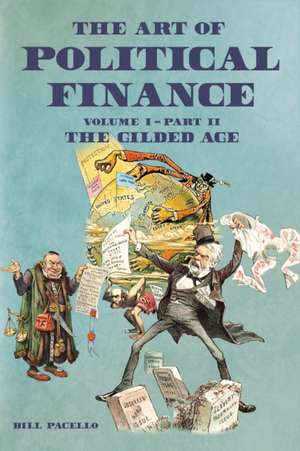The Art of Political Finance: Volume I - Part II
Autor Bill Pacelloen Limba Engleză Paperback – 28 apr 2020
| Toate formatele și edițiile | Preț | Express |
|---|---|---|
| Paperback (2) | 278.87 lei 3-5 săpt. | |
| Faithful Life Publishers – 28 apr 2020 | 278.87 lei 3-5 săpt. | |
| Faithful Life Publishers – 16 mar 2020 | 298.24 lei 3-5 săpt. | |
| Hardback (2) | 331.79 lei 3-5 săpt. | |
| Faithful Life Publishers – 28 apr 2020 | 331.79 lei 3-5 săpt. | |
| Faithful Life Publishers – 15 mar 2020 | 357.38 lei 3-5 săpt. |
Preț: 278.87 lei
Nou
Puncte Express: 418
Preț estimativ în valută:
53.36€ • 55.71$ • 44.16£
53.36€ • 55.71$ • 44.16£
Carte disponibilă
Livrare economică 15-29 martie
Preluare comenzi: 021 569.72.76
Specificații
ISBN-13: 9781630733186
ISBN-10: 1630733180
Pagini: 394
Dimensiuni: 152 x 229 x 25 mm
Greutate: 0.84 kg
Editura: Faithful Life Publishers
ISBN-10: 1630733180
Pagini: 394
Dimensiuni: 152 x 229 x 25 mm
Greutate: 0.84 kg
Editura: Faithful Life Publishers
Notă biografică
Bill Pacello was born in 1963 and grew up in the 1970s in the small town of Audubon, New Jersey. Bill graduated from Audubon High School in 1981 and received his Bachelor of Arts degree in business from Rutgers University in 1986. While attending both of those institutions, he spent a significant amount of his energy on the baseball field toward a well-rounded life and achieved area and state honors. After working in the waste, construction, and electronics industries, Bill returned to Rowan University in 1993 where he received a public school teaching certification. During his post-baccalaureate study, he began to develop computer skills and found work in the information technology department at a chemical company in Philadelphia. There he began learning the SAP enterprise system and soon embarked on a consulting career at IBM. After a few years of travel and settling in at one of its service delivery centers, his assignment and his time at IBM had run its course. Although treated well, the life behind a computer all day in a cubicle, office, or boiler room with no natural light began to weigh on his soul and his psyche. So, in 2005, faced with the prospect of being on an airplane every week for a second stint, he left IBM for a new life as an entrepreneur trying to capitalize on the motorcycle, tattoo, and t-shirt embellishment trend. The irony was that he had to leave one of the most esteemed companies in the information industry that offered many opportunities within the IT-sphere to explore an untapped part of his brain. But creativity and business experience were not enough to compete with low international labor rates and distribution channels leveraged by the highly capitalized retail giants in the 21st century "go big or go home" commercial arena. These experiences, along with Pacello's non-political affiliation and effort to adhere to the Christian faith, have fueled a perspective that will cut into both sides of the mainstream narrative. His first two books, The Art of Political Finance Part I and II, show the unfolding and proliferation of fiat currency and debt in early America and how it began to undermine individual freedom, liberty, national independence, and spirit, prior to the establishment of the Federal Reserve. The research and analysis provide an alternative for readers and young Americans so that they may better understand the 21st century bazaar, especially in an America with ratcheted discord after events like 911 and the "Great Recession" where each generation seems to be more apt to consumption and predation than the former.
